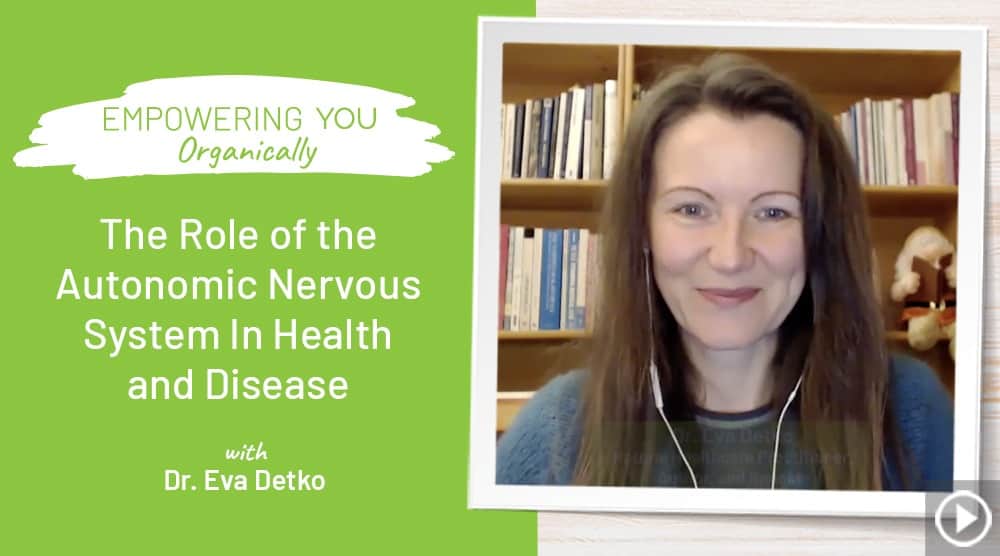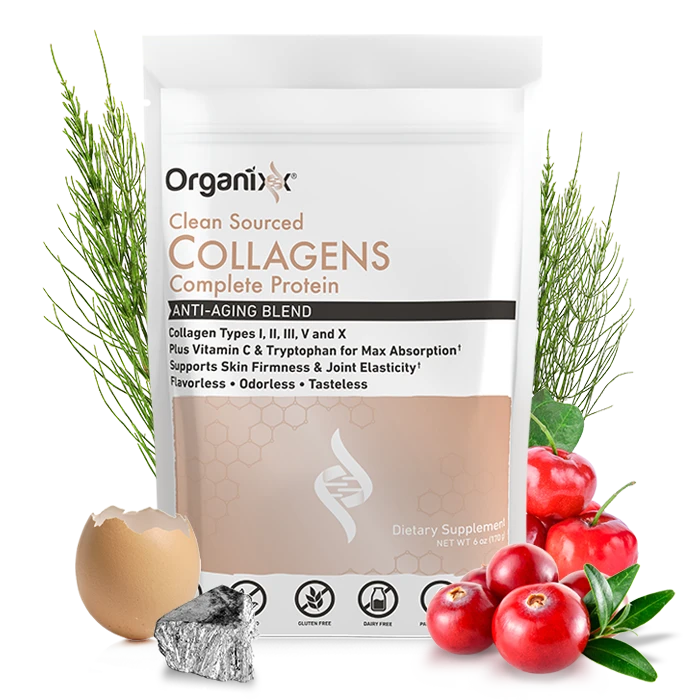Empowering You Organically – Season 10 – Episode 85
Title: The Role of the Autonomic Nervous System In Health and Disease
Hosts: Jonathan Hunsaker, TeriAnn Trevenen
Guest: Dr. Eva Detko
Description: Did you know that the nervous system is intimately connected with our immune system and our endocrine system? Any stressor that we introduce into the system, the body doesn’t really tell the difference. It reacts the same way to whatever stressor we’re talking about. That obviously affects the nervous system immediately, but that will have a knock-off effect on the immune function and the gut, and also, the endocrine, the hormonal function. When you’re thinking about hormonal imbalances, this has the obvious potential to just throw everything off. Tune in today and let Dr. Eva Detko educate us on how we can manage our autonomic nervous system for better health.
* * *
FEATURED PRODUCT
Powerful Proteins Help Smooth Wrinkles, Keep Skin Plump, and Promote Joint Health
- FOUR COLLAGEN SOURCES: We’ve combined collagen types I, II, III, V and X – the major types of collagen your body needs – from four different sources (grass-fed cows, wild-caught fish, antibiotic-free chicken, eggshell membrane) for the ultimate matrix of health benefits.
- HIGHLY BIOAVAILABLE: Clean Sourced Collagen is formulated with VItamin C, Horsetail Extract and Zinc for maximum absorption.
- EASY TO TAKE: Our revolutionary, odorless, tasteless, and easy-to-mix Clean Sourced Collagens can be added to a wide variety of healthy foods or mixed into water, juice, or your favorite smoothie.
- NATURAL INGREDIENTS: We only use the purest ingredients found on Earth and our supplements are free from artificial flavors, preservatives, colors, yeast, soy protein, sodium, starch and are non-GMO.
* * *
About Dr. Eva Detko
Dr Eva Detko is a natural healthcare practitioner, author, and speaker. She has studied natural medicine and the human mind for over 20 years.
Dr Eva successfully recovered from chronic fatigue and fibromyalgia, and reversed Hashimoto’s thyroiditis. She now helps others recover their health.
Dr Eva has an extensive knowledge and experience in the field of human physiology, biochemistry, nutritional sciences, and bioenergetics. She also uses a wide range of mind-transforming modalities, including: Havening Techniques®, BrainWorking Recursive Therapy®, psychoanalysis, hypnotherapy, mindfulness, NLP, and applied psychoneuroimmunology.
Working with Dr. Eva
- “I just want to be able to work with a wide range of people, not just on the chronic illness side, from the physical point of view, because I do that also, but actually have that more rounded, complete approach and address the emotional factors as well. And the more tools I have, the more I’m able to tackle, and whatever people throw at me, I have some tool in my toolbox to be able to help them and direct them, and help them get through whatever they’re experiencing, get them through to the other side and teach them enough for them to be able to do their own work as well, because that’s how I like to work.”
Dr. Eva’s Journey
- My trauma started already in-utero, because my mom, when she was three months pregnant with me, had a trauma herself, and what happened was her sister died, her younger sister died as a result of a vaccine injury.
- This was obviously extremely traumatic for the entire family, but what that did to my mom, she wasn’t coping with that trauma particularly well. She just didn’t have the right tools. And she went into this complete state of shock. She was in such distress that her pregnancy became toxic.
- And as a result of that, obviously, it had a knock-on effect on myself and on my sibling. And I was the one who survived, but my baby brother or sister, in fact, we will never know, because when she came to give birth, the baby was decomposed to the point where they were not even able to tell.
- The birth was extremely traumatic, because she was so sick that she nearly died. In fact, there was a bit of a debate whether to focus on saving her or whether to focus on saving me. At some point, they were not sure whether they were able to save us both.
- As a result of this, I was actually quite a weak child. I would get a lot of infections.
- And I was also emotionally quite weak. So, I was bullied at school.
- And I also suffered sexual abuse when I was young as well.
- When I got sick, it was no longer an option. I knew there was just so much there that there was no way that I was going to recover, if I had any doubt with all of this, and I needed to dissect it.
Tools
- Hypnotherapy
- Neurolinguistic programming
- Havening techniques
- It’s literally a psychosensory technique, so it’s about stimulating receptors on the skin to, like I said before, remodel the neurology.
- Brain working recursive therapy
- Mindfulness
- Meditation
Autonomic Nervous System (ANS)
Autonomic nervous system is part of the nervous system that supplies our internal organs.
- the blood vessels, stomach, in fact, the whole of the digestive system, kidneys, bladder, genital, and so on.
- And we used to describe the autonomic nervous system as the system that is just the fight or flight, the sympathetic, and then there is this parasympathetic relaxation response.
- As a result of the work of Stephen Porges and the polyvagal theory, we understand there are two branches of the ANS
- the sympathetic branch, which is the fight and flight response, the stress response
- the parasympathetic branch, which is basically synonymous with the vagus nerve However, the vagus nerve is not just one thing.
- If you activate your vagus nerve, that means you obviously are more relaxed, and your gut works better, and everything works better.
- But the vagus nerve has actually two branches as well.
- We’ve got the ventral vagus complex, which we know and refer to as the vagus nerve.
- We also have the other side of the vagus nerve, which is also the parasympathetic nervous system response, which is the freeze response.
- The nervous system is intimately connected with our immune system and our endocrine system.
- Any stressor that we introduce into the system, the body doesn’t really tell the difference. It reacts the same way to whatever stressor we’re talking about.
- That obviously affects the nervous system immediately, but that will have a knock-on effect on the immune function and the gut, and also, the endocrine, the hormonal function.
- When you’re thinking about the hormonal imbalances, that obviously just throws everything off.
- As humans, we’re supposed to operate in a relaxed state 90 percent of our days. What actually tends to happen for a lot of people is the other way around, 90 percent of the time, they will operate in the stress response, in that sympathetic nervous system
- Because most people live in this what we call a sympathetic dominant state, they burn this system out.
- Back in the 90s, the ACEs study, when they looked at the relationship between early exposure to stress and chronic illness later in life, we have correlation with just about every illness that we can think of.
Polyvagal Theory
- The ventral vagus complex is the relaxation, it’s the relax, heal, detoxify response.
- We don’t heal unless that is activated. We do not heal in sympathetic or freeze mode. We can only heal, the body can only heal if we activate the rest, digest, detoxify, and heal response, which is basically the vagus nerve.
- What Stephen Porges actually talks about is he actually named the ventral vagus complex, so the vagus nerve as we know it, he called it the social nervous system.
- If we have healthy vagus function, we can read other people’s expressions and we get it right.
- When we have poor vagal function, we will completely misinterpret the cues from other people.
- When that vagus nerve function is compromised, we just lose that ability to really tell what is what in our social connections. We actually also have difficulty self-regulating.
How can a parent understand if they’re giving their child enough nurturing without crossing the line of giving too much?
- You will screw your kids up. You will. You cannot possibly, no matter how wonderful a parent you are, how self-aware, how aware of your kids’ needs and everything else you are, you cannot satisfy those needs 24/7, constantly, constantly, constantly.
- There will be moments where the kid will just feel like they’re just not getting enough nurturing.
- Look a little bit more into the different stages of child development. You have your infancy stage, you’ve got your toddler stage, you’ve got your preschooler and so on, and then school stage. And at all of those stages, the needs of the child are different, and they will be learning different things.
- The first stage, the infancy stage, you cannot give them enough. You can’t give them too much in terms of cuddles and kisses.
- One of the things that I would recommend, John Bradshaw wrote a number of books. The book Homecoming explains actually, in a very simple way, the different stages of child development.
- Be aware of the personality type of your child. So, personality styles are really strategies, and a lot of it is as a result of what we experienced in childhood, but there will be certain tendencies already from the word “Go.”
- Perhaps you can then help them with some of the things that maybe still need to be developed but don’t come so naturally to them.
* * *
Subscribe to Empowering You Organically
Never miss an episode!





